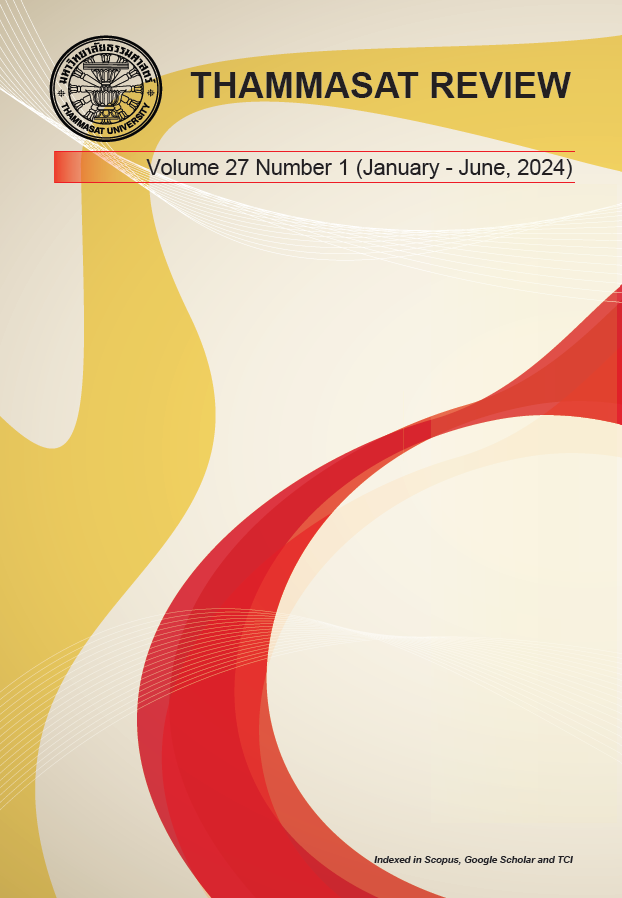Strategizing Beyond the Field: Assessing Transferable Skills and Post-Retirement Career Planning among Young Elite Thai Athletes
Keywords:
Career Transition, Olympic Sports, Skill Transferability in Sports, Post-Retirement Planning, Thai Student AthletesAbstract
Due to the extensive time dedicated to sports from an early age, many athletes are unable to allocate time for other activities, and thus struggle to plan for post-sport careers. Since 2005, the International Olympic Committee has initiated the Athlete Career Program, and in Thailand, the Thailand Olympic Academy has been providing educational opportunities for Thai athletes since 2017. However, there is a lack of research on transferable skills and life planning after sports retirement specifically targeting young Thai athletes. The objective of this study is to elucidate the relationship between student athletes’ perception of transferable sports skills to explore the application of these skills in their lives after retirement from sports. This study surveyed 92 university student athletes (51 males and 41 females) who participated in 25 Olympic sports at the 30th Manila Southeast Asian Games in 2019. The survey response rate was 100%, and factor analysis and regression analysis were conducted. The results revealed that ‘Social and Professional Competence’ and ‘Collaborative Competence’ are key transferable skills from sports, significantly impacting athletes’ perception of skill transferability and development confidence. This result provides a valuable framework for developing targeted interventions and educational programs aimed at facilitating successful career transitions for athletes.
References
Alfermann, D. (2000). Causes and consequences of sport career termination. Career Transitions in Sport: International Perspectives, 45-58.
Baillie, P. H. (1993). Understanding retirement from sports: Therapeutic ideas for helping athletes in transition. The Counseling Psychologist, 21(3), 399-410.
Campus-Star. (2018). The top ten skills that employer needs from the newly graduated students. https://campus.campus-star.com/jobs/86238.html
Chalfin, P. L. (2014). The value of intercollegiate athletic participation from the perspective of employers [Masters Thesis, University of North Carolina at Chapel Hill]. Carolina Digital Repository.
Danish, S. J., Petitpas, A. J., & Hale, B. D. (1993). Life development intervention for athletes: Life skills through sports. The Counseling Psychologist, 21(3), 352-385.
Good, R. C., & Troxel, W. M. (2015). Ways In Which Participation In Intercollegiate Athletics Contributes To The Learning And Development Of Student-Athletes.
Larson, R. W. (2000). Toward a psychology of positive youth development. American psychologist, 55(1), 170.
Mayocchi, L., & Hanrahan, S. (1997). Adaptation to a post-athletic career: The role of transferable skills. National Sports Research Centre.
Mayocchi, L., & Hanrahan, S. J. (2000). Transferable skills for career change.
McKnight, K. (2007). Athletic career transition and transferable skills.
McKnight, K., Bernes, K., Gunn, T., Chorney, D., Orr, D., Bardick, A., & Canada. (2009). Life After Sport: Athletic Career Transition and Transferable Skills. Journal of Excellence, 13.
National Olympic Commitee of Thailand. (2017). THA - Report of the IOC ACP Outreach Workshop on 8th July 2017 in Bangkok Thailand. Bangkok: NOCT
National Olympic Commitee of Thailand. (2019). THA - Report of the IOC ACP Outreach Workshop on 8th March 2019 in Bangkok Thailand. Bangkok: NOCT
Nunnally, J. C. (1975). Psychometric theory—25 years ago and now. Educational Researcher, 4(10), 7-21.
Pearson, R., & Petitpas, A. (1990). Transition of athletes: pitfalls and prevention. Journal of counseling and development, 69(1), 7-10.
Petitpas, A., Danish, S., McKelvain, R., & Murphy, S. (1992). A Career Assistance Program for Elite Athletes. Journal of Counseling & Development, 70, 383-386. https://doi.org/10.1002/j.1556-6676.1992.tb01620.x
Schlossberg, N. K. (1981). A model for analyzing human adaptation to transition. The Counseling Psychologist, 9(2), 2-18.
Shiina, S., Brewer, B. W., Petitpas, A. J., & Cornelius, A. E. (2003). Effects of transferable skills workshops on the career self-efficacy of college student-athletes. Academic Athletic Journal, 17(Winter/1).
Sinclair, D., & Orlick, T. (1993). Positive Transitions from High-Performance Sport. The Sport Psychologist, 7, 138-150. https://doi.org/10.1123/tsp.7.2.138
Singprom, R., Sriyabhaya, A., & Samahito, S. (2021). Welfare Provision for Thai Olympians. Suan Sunandha Academic & Research Review, 15(2), 1-25. https://so05.tci-thaijo.org/index.php/ssajournal/article/view/251600
Tabachnick, B. G., & Fidell, L. S. (2013). Using Multivariate Statistics. Pearson Education. https://books.google.co.th/books?id=ucj1ygAACAAJ
Taylor, J., & Ogilvie, B. (1994). A conceptual model of adaptation to retirement among athletes. Journal of Applied Sport Psychology - J APPL SPORT PSYCHOL, 6, 1-20. https://doi.org/10.1080/10413209408406462
Vasileiadou, C. (2016). Supporting the Holistic Development of the Athlete: A Study on the Formal Organization behind the Provision of Dual Athlete Career Programs (DACPs) from a Management Perspective. Sport and Olympic-Paralympic Studies Journal, 1, 44-58.
Zaichkowsky, L., Kane, M., Blann, W., & Hawkins, K. (1993). Career transition needs of athletes: A neglected area of research in sport psychology. Proceedings: 8th World Congress of Sport Psychology, Lisbon, Portugal,
Downloads
Published
How to Cite
Issue
Section
License
Copyright (c) 2024 Thammasat Review

This work is licensed under a Creative Commons Attribution-NonCommercial-NoDerivatives 4.0 International License.
The opinions and ideas expressed in all submissions published in Thammasat Review are solely that of the author(s) and do not necessarily reflect that of the editors or the editorial board.
The copyright of all articles including all written content and illustrations belong to Thammasat Review. Any individuals or organisation wishing to publish, reproduce and distribute a particular manuscript must seek permission from the journal first.








